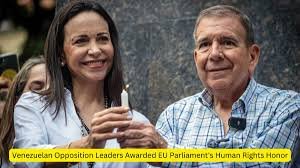Venezuelan Opposition Leaders Awarded EU Parliament’s Human Rights Honor
Introduction
In a historic move, the European Parliament has honored Venezuelan opposition leaders with its prestigious Human Rights Award, recognizing their dedication to democratic principles and human rights in Venezuela. The acknowledgment is a powerful international stance against human rights violations and political suppression in Venezuela, bringing attention to the challenges the country faces in maintaining democratic integrity. This news is pivotal as it highlights the EU’s support for global democracy and the potential impact on international relations, especially in Latin American politics.
The EU’s Sakharov Prize for Freedom of Thought
The Sakharov Prize for Freedom of Thought, awarded annually by the European Parliament, represents one of the most significant acknowledgments of human rights advocacy worldwide. By awarding this prize to Venezuelan opposition leaders, the EU has endorsed the movement for democracy and opposition to authoritarian governance in Venezuela. Named after Soviet dissident Andrei Sakharov, the award not only symbolizes global recognition but also includes a grant to further human rights causes. This accolade could potentially invigorate the opposition movement in Venezuela and provide international solidarity for their cause.
Implications for Venezuela’s Democracy Movement
Venezuelan opposition leaders, including exiled lawmakers and activists, have campaigned tirelessly against political oppression, often facing persecution and exile. The award signifies a reinforcement of their efforts, potentially drawing international support and resources to strengthen the Venezuelan democracy movement. The EU’s public recognition of these leaders also pressures the Venezuelan government to address human rights abuses, offering a morale boost to Venezuelan citizens fighting for change.
Global Reactions to the Award
Countries around the world, particularly within the European Union and the Americas, have shown support for the EU Parliament’s decision. This recognition places pressure on other global entities and governments to reevaluate their stance toward the Venezuelan government and its treatment of opposition leaders. By endorsing these leaders, the European Parliament encourages similar actions globally, which may lead to further scrutiny of Venezuela’s policies.
Why This News is Important
Promoting Human Rights and Democracy
The European Parliament’s decision to honor Venezuelan opposition leaders amplifies the global call for democracy and human rights, particularly in nations experiencing political repression. Recognizing activists struggling for democratic rights highlights international support for fundamental freedoms.
Impact on International Relations
This recognition strengthens the diplomatic stance of the European Union in advocating for global human rights. It may inspire other international bodies and nations to adopt firmer stances on human rights violations in countries facing similar issues, like Venezuela.
Encouraging Global Accountability
With this award, the EU Parliament signals to authoritarian regimes worldwide that the international community remains vigilant regarding human rights violations. It encourages authoritarian nations to consider the consequences of political suppression and human rights abuses.
Historical Context
The Legacy of the Sakharov Prize
Named after Soviet physicist and dissident Andrei Sakharov, the Sakharov Prize has been awarded annually since 1988 to individuals and groups that demonstrate significant efforts in defending human rights and freedom of thought. Previous recipients include Nelson Mandela, Malala Yousafzai, and the Belarusian democratic opposition, highlighting the prize’s emphasis on global democracy. The prize is particularly symbolic as it supports movements against political oppression, making it fitting for Venezuelan opposition leaders striving for democratic governance in a challenging environment.
Venezuela’s Political Crisis and Opposition Movement
Venezuela’s political crisis began in the early 2000s and escalated in the 2010s, as economic mismanagement, corruption, and authoritarian policies drove the nation into turmoil. The country has seen rising inflation, widespread poverty, and mass emigration, with opposition leaders frequently facing persecution. International support for the Venezuelan opposition has grown, with this latest recognition serving as a renewed commitment from the European Union to support democracy in Venezuela.
Key Takeaways from Venezuelan Opposition Leaders Awarded EU Parliament’s Human Rights Honor
| S.No. | Key Takeaway |
|---|---|
| 1 | The European Parliament awarded the prestigious Sakharov Prize for Freedom of Thought to Venezuelan opposition leaders. |
| 2 | The award highlights the EU’s commitment to supporting democracy and human rights globally, especially in authoritarian-ruled nations. |
| 3 | Venezuelan opposition leaders face severe repression, with many exiled or imprisoned due to their political activities. |
| 4 | The Sakharov Prize aims to provide moral and financial support to these leaders, bolstering their democratic efforts. |
| 5 | This international recognition pressures the Venezuelan government to address human rights issues and could strengthen global solidarity. |
Important FAQs for Students from this News
Q1: What is the Sakharov Prize for Freedom of Thought?
A: The Sakharov Prize for Freedom of Thought, established by the European Parliament, is awarded annually to individuals or groups that dedicate their efforts to defending human rights and freedom. Named after Soviet dissident Andrei Sakharov, it includes a financial grant for furthering human rights causes.
Q2: Why did the EU Parliament award Venezuelan opposition leaders the Sakharov Prize?
A: The EU awarded this prize to Venezuelan opposition leaders to recognize their dedication to democratic values and human rights amidst significant political repression in Venezuela.
Q3: How does the Sakharov Prize benefit the opposition leaders in Venezuela?
A: The Sakharov Prize not only brings international recognition and moral support but also provides financial assistance to aid their efforts for democracy and human rights.
Q4: What impact does this award have on Venezuela’s political climate?
A: The award increases international awareness of the human rights violations in Venezuela, putting pressure on the government and inspiring global entities to take a firmer stance on democratic freedoms.
Q5: How does the EU’s decision affect other countries facing political repression?
A: The EU’s recognition signals to other countries with authoritarian governance that international accountability exists, potentially encouraging democratic movements and highlighting human rights abuses worldwide.

